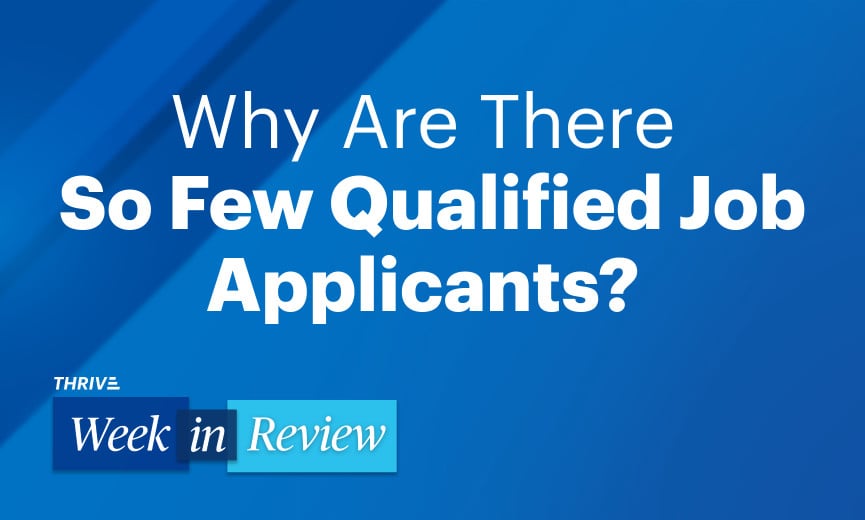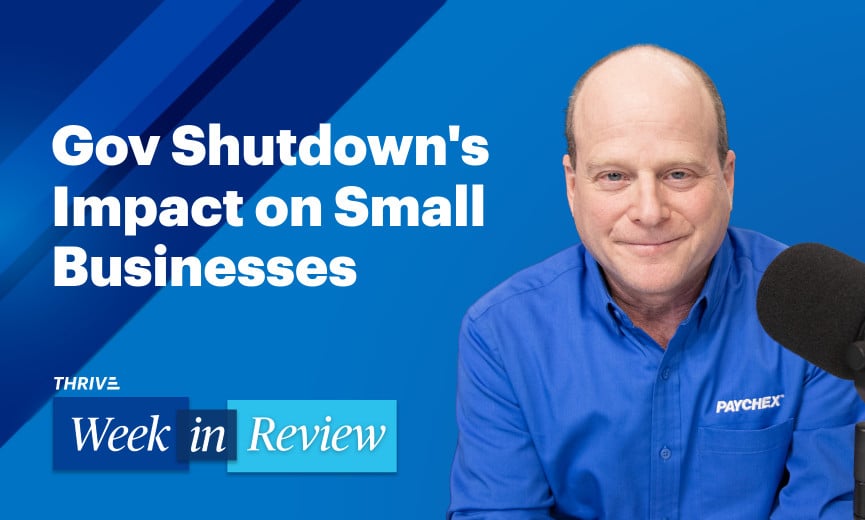- Thrive
-
Temporada
4Episodio123
La IA, la IA, ¡oh, espere! Las ganancias de productividad no se materializan y los seres humanos son más rentables

Podcast •

Resumen
La adopción de la inteligencia artificial por las compañías avanza rápidamente, y Gene Marks afirma que esto es algo positivo para ayudar a que su empresa se mantenga a la vanguardia. Sin embargo, Gene también señala algunos estudios que ponen en perspectiva el uso de la IA. Según un informe, el aumento de la productividad no es el prometido, mientras que otro demuestra que utilizar la IA para realizar el trabajo de las personas solo es beneficioso económicamente en uno de cada cuatro empleos. Escuche episodio “Week in Review” del pódcast de Paychex THRIVE para obtener más detalles.
Ver transcripción
[Gene Marks, host]
Hey, everybody, this is Gene Marks, and welcome to this week's edition of the Week in Review, a weekly podcast from the Paychex THRIVE podcast series, where we pull out certain news items that impact your small business and discuss a little bit about how they impact it.
Now, you know, we generally talk about different things in HR and politics, the economy, public policy, things like that. This week, though, there were a couple of news items that I wanted to share with you that all have to do with one topic, and that's AI or artificial intelligence.
I know, I know, I know. You have been hearing and inundated with tons of information and news and predictions and, you know, scary things all about artificial intelligence. Is it going to, you know, take over the world control or military, eliminate millions of jobs, all that kind of stuff? And in all honesty, we're still very early days, and I don't really think that people really know the answers to these questions. But there was some news this week that I think will help you better get your arms around the impact of AI.
So, the first has to do with a study or a report that came and was announced at the World Economic Forum this past week in Davos, Switzerland. The report said that the despite quick adoption of generative A. tools in the workplace, major productivity gains have not been realized.
Now, again, this report indicates that more than half of employees worldwide now use some type of generative AI at work with even higher rates in some countries. However, most employees still need training to fully realize productivity benefits, and senior level leaders are concerned about losing their jobs to junior employees with AI training.
John Romeo, who is the CEO of the Oliver Wyman Forum – they're the ones that produced these reports – he said that the adoption rate of generative AI has been nothing short of remarkable. He said ChatGPT achieved mass adoption in less than one year, which was a stark contrast to the internet, but training is not keeping up, and we are facing an AI productivity disconnect.
Now, the report surveyed 25,000 people across 16 countries. Of all those countries, India appears to lead in terms of employee adoption with 83% of respondents reporting daily or weekly use of generative AI. In contrast, weekly use in North America and Europe is below 50%. Even as consistent use increases, the full potential productivity gains could be 6 to 10 years away.
About 20% of the employees who reported that generative AI hasn't increased their productivity also said they're up for corporate guidelines – they're held up by corporate guidelines and unsatisfactory output from AI tools. So, the report from Davos this past week basically says that generative AI is not producing productivity gains.
Now, there was another report that was released this past week by MIT. It found that using AI instead of humans in certain aspects of it only makes financial sense in about one-fourth of jobs. The researchers at MIT who did their study, they found that companies hoping to automate tasks that require visual inspections are unlikely to realize cost benefits in the near term.
So, they focused on looking at AI for visual use; You know, they're using cameras to look at stuff and understand it and do something with it. They have found that those type of productivity gains are nowhere there. The study reviewed has performed by humans, which could be carried out through computer vision, right, so quality inspections or medical imagery scans.
Most U.S. businesses would choose not to automate the majority of these tasks that have exposure to AI replacements, given the cost of putting those systems in place, according to the researchers. However, researchers expect that the rollout of AI could accelerate if costs for deployment fall rapidly or if AI is a service platform that can deliver benefits at scale.
So again, in one application of AI – this is using AI for vision-based tasks – basically, this MIT study found that humans are better than AI right now. The cost is just too high.
In the final bit of bad news for AI this past week, it has to do with Microsoft Copilot Pro. This news comes from Forbes and actually comes from, well, yours truly. I wrote a piece in Forbes just this past week that says that I'm advising my clients to stay away from Microsoft Copilot Pro this year.
Now, what is my Microsoft Copilot Pro? It is. It's an AI tool that gets installed with Microsoft Office 365 and the features and functionality of it look great. They can help us create better Word documents and enhance our emails. They can automatically do – Copilot Pro can help us automatically do PowerPoint presentations and help us to attend more than one Teams Meeting at one time. Copilot Pro can help us with supply chain questions and make things easier to report. And on the Excel, you know, if we're using Excel, it will help us do automatic analysis and create, you know, macros and graphs and things like that to make our life a lot easier.
So, Microsoft introduced this just this past week, as well, and unfortunately, the response has not been great. First of all, a lot of people have been reporting performance issues and they're also reporting that it's really not doing what it says it can do yet. It's in early days.
In my Forbes column, I featured a video that was done. It was an excellent video by a guy named Luke Verus – you can read my Forbes column, there's a link to the video. He's like your computer nerd and he dug into Copilot Pro and using it with Excel and although he tried to put a good face on it, he walked away pretty disappointed.
You know, it couldn't handle, you know, a decent amount of data. The output wasn't that great. Its responsive times weren't that great either. He wasn't really excited about the security over the data yet issues with it.
The bottom line, guys, is that, you know, it's still early days for Microsoft Copilot Pro. I mean they released it. You can subscribe to it now. You know it's going to get better. You know it will. But right now I just don't think it's ready for prime time and I'm telling my clients in this Forbes article: Hold back and wait for Microsoft to work out the kinks and make it that much better.
Twenty twenty-four is going to be a year for us to be getting ready for really good AI tools. We’ve got to be a little patient. Clean up your database, get your data together, because AI is not going to be that great unless it's working off good data, you know?
In addition to that, talk to your vendors. Make sure that you're fully up to speed on the new features and functionality they have coming out, and then lean into it. I mean, Microsoft is a good example. I mean, Copilot Pro – sure, buy a couple of licenses, get a little bit of training, learn not only what it does, but what it's going to do, what direction that they're heading with it, so that you can be on top of it and ahead of the curve and really leveraging some of these tools because I am telling you sooner rather than later, these tools are going to be very, very powerful for everybody to use.
The smart companies that are running most efficiently and keeping their overhead under control, they're going to be investing in using these AI tools. So, early days yet, but I still say in the future, in the not too distant future, AI is going to be a big part of your business, and you've got to make sure that you're aware of these tools.
My name is Gene Marks and you've been listening to the Paychex THRIVE Week in Review podcast. If you need any advice or tips or help or want to suggest a guest for our Paychex THRIVE series, please visit us at payx.me/thrivetopics.
Thanks again for listening. Again, my name is Gene Marks. I'll be back to you next week with some more news that impacts your business and some thoughts on how it does and what to do. We look forward to talking with you then. Take care.
This podcast is property of Paychex, Inc. 2024. All rights reserved.

 Apple Podcast
Apple Podcast Spotify
Spotify iHeartRadio
iHeartRadio








